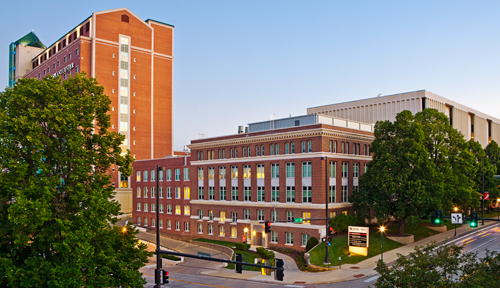Kyle Meyer, Ph.D., dean of the UNMC College of Allied Health Professions, joined University of Nebraska President Hank Bounds, Ph.D., and other key NU constituents this week in testifying before the Legislature’s Appropriations Committee in support of a proposal to extend a state-university partnership on building renovation and renewal projects across the campuses.
Dr. Meyer on the renovation
The following is a portion of Dr. Meyer’s remarks before Nebraska state legislators earlier this week:
“In 2006, following the passage of LB 605, the Board of Regents approved the renovation of Bennett Hall. Constructed in 1918, Bennett Hall is the second oldest building on the UNMC campus. It had not been renovated in more than 40 years and its space had become antiquated. But it was structurally sound and ideally located to redesign and repurpose. Estimated costs to replace Bennett Hall were over two times the $8.9M renovation budget. The renovation created over 66,000 square feet of state-of-the-art office and education space.
“Our 10 programs, previously scattered across the campus, were consolidated in the newly renovated Bennett Hall representing the first time the programs had been in one building in our 36-year history. Collocating the programs in a beautifully designed and renovated workspace significantly elevated awareness about our programs and their importance, both at UNMC and
across the university system. It also dramatically improved opportunities for collaboration, led to more efficient work processes, improved planning and resource allocation, and led to a growth in research collaborations and funding. And the new facility significantly enhanced recruitment of outstanding faculty and students.”
The proposal, endorsed unanimously by the Board of Regents in December, is sponsored by Speaker of the Legislature Galen Hadley in LB 858. It would continue a partnership that began almost 20 years ago and has resulted in updated classrooms, labs and offices that have played a critical role in student success and academic excellence.
Dr. Meyer shared with legislators the story of how the renovated Bennett Hall in 2008 became the first real home for UNMC’s allied health programs.
The upgrades, facilitated by past legislation, paved the way for a more visible and collaborative presence on campus, momentum in faculty and student recruitment, growth in research activity and reputation, and the then-school’s recent transition to a college, reflecting its increased stature and statewide presence.
“It is not an exaggeration to say that the momentum my college is experiencing today can be credited in large part to this renovation,” Dr. Meyer told legislators.
The state and university currently make matching annual investments of $11 million in deferred maintenance projects. Under LB 858, both partners would increase their annual investments by $11 million to finance a $400 million bond. The bond funds would be available for renovation projects across the university that were selected through a strategic, data-driven process.
In testimony submitted to the Appropriations Committee, Dr. Bounds thanked Speaker Hadley for his leadership and support and said: “The need for quality, modern, functional buildings is as important today as it has ever been. We are operating in the most competitive higher education marketplace of our lifetimes. To fulfill our responsibility to meet the needs of the state, we have to put ourselves in a position to be competitive in the current environment. That means providing quality facilities.”
Bounds highlighted a new, independent analysis of the university’s impact on the state which found that NU’s teaching, research and outreach activities grow Nebraska’s economy by $3.9 billion annually. Sustaining an impact of that magnitude requires a proactive approach, he said, noting that deferred maintenance needs can’t be ignored.

Couldn't more strongly agree with Dr. Meyer that our beautiful facility in Bennett Hall has had a significant improvement in our effectiveness as a Division of PA Education and tremendously increased our collaboration with other teams in the College of Allied Health Professions. We're able to reach broader goals of high quality education and research, leading to improved patient care and professional growth, than could have been accomplished when the programs were scattered. Thanks to President Bounds and Dr. Meyer for their leadership in pursuing further opportunities for facility improvements that have this impact.